-
oa Terug naar Bonger
Over een valse start en plots plankgas in de Nederlandse sociologie
- Amsterdam University Press
- Source: Mens & Maatschappij, Volume 97, Issue 3, okt. 2022, p. 246 - 265
-
- 01 okt. 2022
Samenvatting
Bonger revisited. On a false start and a sudden full speed ahead in Dutch sociology
Our tentative hypothesis is that institutionalization of an academic discipline, for example by way of university chairs and disciplinary training schools, contributes to scientific progress. Yet, although Bonger contributed to all of sociology’s three main problems (cohesion, inequality and rationalization), his appointment as the first professor for sociology in the Netherlands, did not make for a successful take off. Institutions also have unintended negative consequences. Bonger remained isolated, the 1921 Academic Statute only allowed him to teach minor subjects (criminology and sociology), and he hardly attracted major students. Moreover, Dutch sociology suffered badly in WOII, losing, among other scholars, Bonger. A change in the Academic Statute after WOII led to nine disciplinary training schools at existing universities, and to 12 professorships in sociology. Of the newly appointed professors, only Kruijt and Van Heek developed a successful research programme driven by one main question broken down into several sub questions. In the decades after them, Lammers, focusing on human organizations, formulated two groups of related questions that contributed to the growth of sociological knowledge.


